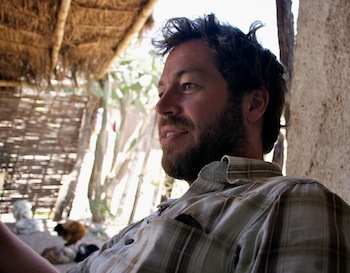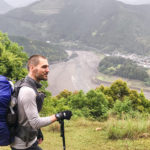Simon Fenton is a travel writer and photographer. After an early career working in the morgues and pools of southern England, he lived, worked and traveled in Asia for several years, financing himself by teaching English, acting in Bollywood movies and working as a pig farmer in Vietnam. He now lives in Senegal with his Senegalese partner, Khady and their sons Gulliver and Alfie, running the guest house that he built. Squirting Milk at Chameleons is an account of his journey to West Africa and a year of life there.
How did you get started traveling?
I started traveling after university. Until that point, I’d fully expected to get a job, settle down and have a family. That didn’t excite me though. I realized after my science degree that I didn’t want to spend my life in a laboratory. Without really knowing what I was doing, I booked a one-way ticket to India. I’d never left Europe before and went into massive culture shock, arriving in Delhi alone at 3am. I soon discovered that the money I thought would last a couple of months was going to go much further and I didn’t return home for two years, having traveled all over Southeast Asia, worked on farms in Australia, returned through Asia across the Karakorum highway, and traveled back to Europe on the trans-Siberian train.
How did you get started writing?
I’d always written a diary and letters home during my twenties and thirties. Family and friends sometimes said I should publish my work, but although I had some great anecdotes I didn’t really feel that I had the narrative for a full length book. When I started living in Senegal, I decided that a blog could be the perfect way to keep my diary and to write up my old stories. After a few years in Senegal living among the Diola tribe, I soon had that narrative for a book: Squirting Milk at Chameleons: An Accidental African, which was published in 2015.
What do you consider your first “break” as a writer?
I was getting some positive feedback on my blog and then submitted one of my stories into The Guardian‘s adventure travel writing competition. It was about a “ghost” I encountered in Namibia. I was a finalist and was published in the newspaper.
As a traveler and fact/story gatherer, what is your biggest challenge on the road?
Life in West Africa is so rich and interesting and I never have any difficulty in gathering stories. I do have to be careful about the stories I tell — I don’t want to give away tribal secrets or upset the local people among whom I’m living. I was very careful to discuss what I was doing with village elders and I used some pseudonyms to protect people’s privacy.
What is your biggest challenge in the research and writing process?
The biggest challenge I had with the writing process of my book was maintaining focus. For example, I had a tendency to throw in anecdotes from earlier travels which was drawing the reader out of the main story.
What is your biggest challenge from a business standpoint?
I’ve created a portfolio career, so managing my time and giving everything attention is my challenge. I make money from writing, photography, making websites, hosting tourists in my guest house, guiding them on tours, selling food and I even run a car parts business with my mechanic here in our Senegalese village. Finding time to write isn’t too difficult as nothing much happens during the heat of the day. Between 11am and 4pm, as people doze, I write.
Have you ever done other work to make ends meet?
I’ve had a variety of jobs. After my initial travels, I worked with an international agricultural company which gave me the opportunity to live and work in Vietnam for four years. Due to a recession, the company closed and I used my redundancy money to travel through Tibet, India again, and then a journey from Kenya down to South Africa. Upon return I thought I’d better be sensible, and so I spent years commuting to London running a social business that provided training and employment to homeless people. It was very rewarding and highly challenging. After 8 years, I was ready to do something creative and work for myself.
What travel authors or books might you recommend and/or have influenced you?
I enjoy the books of explorers such as Wilfred Thesiger and Benedict Allen. One of my favourites of all time is Congo Journey by Redmond O’Hanlon. He wrote a series of books about jungle journeys, always with a quest which was more of an excuse to wander around looking for birds with an inappropriate travel partner. They’re hilarious, interesting, educational and will either make you want to pull on some khaki trousers and crawl through a swamp, or never travel beyond a mainstream tourist destination again! I guess my book was influenced by the genre of books about people setting up new lives in a different culture, such as A Year in Provence
or Driving Over Lemons
. Those are very popular in the U.K., so I pitched my book to the publisher as similar, but as if written by Bear Grylls. A year in Africa with snakes, black magic, machetes, devils, blood, sweat, and quite a few tears.
What advice and/or warnings would you give to someone who is considering going into travel writing?
My advice is to just write. I thought I couldn’t write well, but I practiced every day and by making it public on a blog, I was forced to consider my words carefully. My technique is just to write quickly, blurting everything onto the page and then to go back and cut out as much as possible while retaining my character and any humor. Many of my book reviews comment on the simplicity and easy flow of the writing — I think that’s a compliment. Also, as I’m sure most travel writers will tell you, unless you’re Bill Bryson, you’re probably not going to make enough money to live off your writing. Always dream and never give up, but keep a few income streams available.
What is the biggest reward of life as a travel writer?
The writing process to me was cathartic, therapeutic even. I initially wrote about some upsetting circumstances in my life and even while other difficult events were occurring, at the back of my head I’d be thinking, well at least I’ll have a great story to tell. Since publication, hearing from readers has been very rewarding, especially those that have known my region of West Africa for many years and say that I’ve nailed it, or even explained things they themselves didn’t understand. One reader who lives in the Gambia has bought multiple copies for her friends back in England, as a way of explaining her life to them. I’ve even been approached by strangers who recognize me — that’s great for Khady to see after she’s watched me tapping endlessly into my lap top when I could have been doing something useful!





